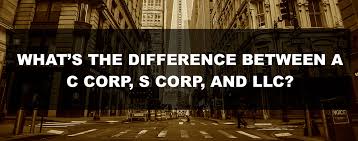Starting Your Business – Which Corporate Form Should You Use?

What are the Differences Between an LLC and the S Corp or C-Corp?
 For those of you that have ever thought about using a corporation when starting your business, including owning rental property, the first question that comes to mind is whether to form an LLC or a Corporation.
For those of you that have ever thought about using a corporation when starting your business, including owning rental property, the first question that comes to mind is whether to form an LLC or a Corporation.
To begin with, you should incorporate (either LLC or Inc.) if you own a business that has any risk of personal liability. In most circumstances, both types of incorporation will insulate you from personal liability for someone getting injured at your business or your products causing injury.
The differences between an LLC and a Corporation fall into a few categories which we will discuss below:
- LLCs ARE MANAGED DIFFERENTLY THAN A CORPORATION
LLCs are managed by managers. These managers can either be owners or can be non- owners. Unlike a corporation, there are no officers or board of directors to report to in an LLC so the control of the Corporation is not as directly in the hands of the owners as in an LLC.
- THE C CORPORATION FORM OF OWNERSHIP HAS THE OPTION OF NOT BEING A PASS-THROUGH ENTITY
Corporations can either be established as a C Corporation or an S Corporation for income tax purposes. Using a C Corporation allows the Corporation to retain profits and losses and then pay taxes on these and be taxed as a “separate entity.” Thus, unlike an S Corporation or LLC, in a C Corporation, profits of the corporation don’t automatically pass through to the personal tax returns of the shareholders.
- THE SINGLE MEMBER LLC, UNLIKE THE S CORPORATION, IS A COMPLETE “PASS THROUGH ENTITY” FOR TAX PURPOSES.
All of the income and expenses from the business gets reported on the single member LLC operator’s personal income tax return. In a single owner S corp, the owner pays himself or herself a salary plus receives dividends from any additional profits the corporation may earn. Thus, the single owner S Corporation, is not merely a “pass through” entity for tax purposes. As a result, the single member LLC shows all income and expenses on their personal tax return. Further, in a single member LLC, the LLC does not file a business tax return which could save some money in tax preparation at tax time.
- S CORPORATIONS CANNOT HAVE NON-U.S. CITIZENS/RESIDENTS AS SHAREHOLDERS and CANNOT BE OWNED BY C CORPRATIONS, OTHER S CORPORATIONS OR LLCS.
Unlike an LLC, all of the S Corporation’s shareholders must be U.S. Citizens/residents. This issue may become larger as more and more foreign nationals seek to purchase real estate in the U.S. This may also be a substantial reason to ensure that real property holding companies are formed as LLCs. Finally, an S Corporation cannot be the subsidiary of another corporation. Thus, if you are considering the sale of your company stock to another company, you will want to consider the LLC or the C Corporation form of ownership.
- THE ENTIRE NET INCOME OF AN LCC IS TREATED AS SALARY TO THE OWNER FOR TAX PURPOSES
The owners of an LLC are taxed on the entire net income of the LLC. This means that the all of the company income is subject to the 15.3% self-employment tax contributions towards Medicare and social security. In an S Corporation, only the wages of the S-Corp shareholder who is an employee are subject to employment tax. The remaining income is paid to the owner as a “distribution” which is taxed at a lower rate if at all!
- THE S CORPORATION HAS A LIFE DISTINCTIVE OF THE OWNERS
Unlike an LLC, the S corporation continues its existence even after the death of an owner, the sale of the shares, or if an owner leaves the company. If any of these events happen in an LLC, it is possible the LLC will end its existence.
The decision as to which form is best for you and the potential tax consequences of each requires the advice of your attorney. If you don’t have an attorney or wish to discuss these options, please feel free to give our office a call. Unlike the online sites, we can speak to your questions directly and for a surprisingly reasonable fee can ensure you are ready to move your business forward.
Theodore J Hamilton, Esq.

